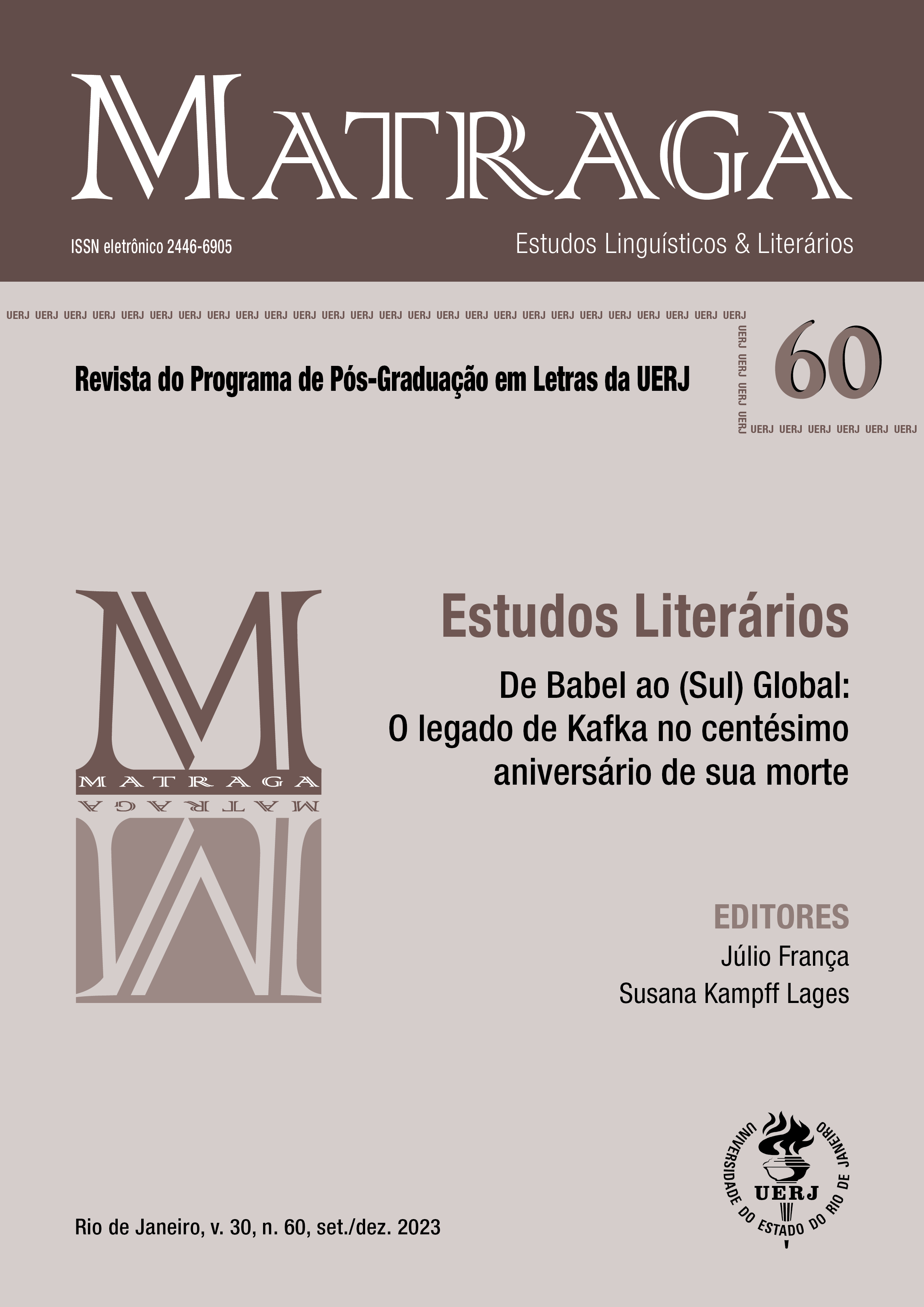“Os espíritos não vão morrer de fome, mas nós pereceremos”: a crítica midiática e os fantasmas epistolares na correspondência de Franz Kafka
DOI:
https://doi.org/10.12957/matraga.2023.75032Palavras-chave:
Kafka, cartas, epistolografia, mídia, tecnologias de comunicaçãoResumo
Este artigo busca discutir a presença das tecnologias de comunicação na correspondência de Franz Kafka com Felice Bauer e Milena Jesenská em diálogo com comentadores da fortuna crítica kafkiana associados à teoria alemã da mídia. Procurando problematizar a relação entre a atividade epistolar, as tecnologias de comunicação e o papel das interlocutoras epistolares de Kafka, tal como ela aparece na fortuna crítica, propõe-se que a obra epistolar de Kafka ganharia em complexidade se lida de forma mais próxima aos problemas de comunicação e subjetividade presentes na chamada “carta dos fantasmas” [Gespensterbrief], que Kafka envia a Milena Jesenská em março de 1922.
Downloads
Referências
ASSIS, Machado de. Esaú e Jacó. [1904]. Disponível em: <https://machadodeassis.net/texto/esau-e-jaco/13998/ chapter_id/16227>. Acesso em: 20 fev 2022.
ALT, Peter-André. Franz Kafka: Der ewige Sohn. München: C.H. Beck, 2005.
AUEROCHS, Bernd; ENGEL, Manfred (Org.). Kafka-Handbuch: Leben - Werk - Wirkung. Stuttgart: J.B. Metzler, 2010.
BARTHES, Roland. Fragmentos de um discurso amoroso. São Paulo: Martins Fontes, 2003.
BENJAMIN, Walter. Magia e técnica, arte e política. Ensaios sobre literatura e história da cultura. São Paulo: Brasilense, 2012.
FREUD, Sigmund. O infamiliar / Das Unheimliche, seguido de O Homem da Areia, de E.T.A. Hoffmann. Tradução Ernani Chaves; Pedro Heliodoro Tavares; Romero Freitas. Belo Horizonte: Autêntica, 2019. [E-book, não paginado].
HARING, Ekkehard W. Das Briefwerk. In: AUEROCHS, B.; ENGEL, M. (Org.). Kafka-Handbuch: Leben - Werk - Wirkung. Stuttgart: J.B. Metzler, 2010. p. 390-401.
JAHRAUS, Oliver. Kafka: Leben, Schreiben, Machtapparate. Stuttgart: Philipp Reclam, 2006.
KAFKA, Franz. Briefe an Felice Bauer und andere Korrespondez aus der Verlobungszeit. Frankfurt am Main: Fischer, 2015.
KAFKA, Franz. Briefe an Milena: Erweiterte und neu geordnete Ausgabe. Frankfurt am Main: Fischer, 1986.
KAFKA, Franz. Cartas a Milena. Tradução António Sousa Ribeiro. Lisboa: Relógio D’Água, 2018.
KITTLER, Friedrich A. Discourse Networks 1800/1900. Stanford: Stanford University Press, 1990.
KITTLER, Friedrich A. The History of Communication Media. CTheory, n. Special Issues: Global Algori¬thms, p. 19, 30, jul. 1996.
KITTLER, Wolf; NEUMANN, Gerhard (Org.). Franz Kafka: Schriftverkehr. Freiburg: Rombach + Ver¬glaghaus KG, 1990a.
KITTLER, Wolf; NEUMANN, Gerhard. Kafkas “Drucke zu Lebzeiten”: Editorische Technik und hermeneu¬tische Entscheidung. Franz Kafka: Schriftverkehr. Freiburg: Rombach + KG, 1990b. p. 30-73.
KREMER, Detlef. Kafka: Die Erotik des Schreibens. Frankfurt am Main: Athenäum, 1989.
LISKA, Vivian. Kafka und die Frauen. In: JAGOU, B. VON; JAHRAUS, O. (Org.). Kafka-Handbuch: Leben - Werk - Wirkung. Göttingen: Vandenhoeck & Ruprecht, 2008. p. 68-80.
NIETZSCHE, Friedrich. O anticristo e Os ditirambos de Dionísio. Tradução Paulo César De Souza. São Paulo: Companhia das Letras, 2016.
SIEGERT, Bernhard. Relays: Literature as an Epoch of the Postal System. Stanford: Stanford University Press, 1999.
Downloads
Publicado
Como Citar
Edição
Seção
Licença

Este trabalho está licenciado sob uma licença Creative Commons Attribution-NonCommercial 4.0 International License.
AUTORIZAÇÃO
A Matraga – Revista do Programa de Pós-Graduação em Letras da UERJ está autorizada a publicar o artigo ora submetido, caso seja aceito para publicação online. Fica atestado que a contribuição é original, que não está sendo submetida a outro editor para publicação, e que a presente declaração é a expressão da verdade.
Os trabalhos publicados no espaço virtual da Matraga – Revista do Programa de Pós-Graduação em Letras da UERJ serão automaticamente cedidos, ficando os seus direitos autorais reservados à Matraga. Sua reprodução, total ou parcial, é condicionada à citação dos autores e dos dados da publicação.

A Matraga utiliza uma Licença Creative Commons - Atribuição-NãoComercial 4.0 Internacional.





